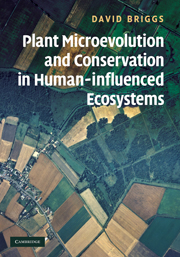Book contents
- Frontmatter
- Contents
- Preface
- Acknowledgements
- List of abbreviations
- 1 Introduction
- 2 Studying change
- 3 Key concepts in plant evolution
- 4 The origin and extent of human-influenced ecosystems
- 5 Consequences of human influences on the biosphere
- 6 Categories
- 7 Investigating microevolution in plants in anthropogenic ecosystems
- 8 Plant microevolution in managed grassland ecosystems
- 9 Harvesting crops: arable and forestry
- 10 Pollution and microevolutionary change
- 11 Introduced plants
- 12 Endangered species: investigating the extinction process at the population level
- 13 Hybridisation and speciation in anthropogenically influenced ecosystems
- 14 Ex situ conservation
- 15 In situ conservation: within and outside reserves
- 16 Creative conservation through restoration and reintroduction
- 17 Reserves in the landscape
- 18 Climate change
- 19 Microevolution and climate change
- 20 The implications of climate change for the theory and practice of conservation
- 21 Overview
- References
- Index
11 - Introduced plants
Published online by Cambridge University Press: 05 June 2012
- Frontmatter
- Contents
- Preface
- Acknowledgements
- List of abbreviations
- 1 Introduction
- 2 Studying change
- 3 Key concepts in plant evolution
- 4 The origin and extent of human-influenced ecosystems
- 5 Consequences of human influences on the biosphere
- 6 Categories
- 7 Investigating microevolution in plants in anthropogenic ecosystems
- 8 Plant microevolution in managed grassland ecosystems
- 9 Harvesting crops: arable and forestry
- 10 Pollution and microevolutionary change
- 11 Introduced plants
- 12 Endangered species: investigating the extinction process at the population level
- 13 Hybridisation and speciation in anthropogenically influenced ecosystems
- 14 Ex situ conservation
- 15 In situ conservation: within and outside reserves
- 16 Creative conservation through restoration and reintroduction
- 17 Reserves in the landscape
- 18 Climate change
- 19 Microevolution and climate change
- 20 The implications of climate change for the theory and practice of conservation
- 21 Overview
- References
- Index
Summary
While there are examples of remarkable natural long-range dispersal of plants (Ridley, 1930), human-mediated trans-global movement of a wide range of organisms has resulted in an extraordinary dispersal of alien species. A very large number of species have been, and are being, accidentally or deliberately transported vast distances to new regions across the world, well beyond the limits of natural dispersal. Some of these have proved to be winners: others have been less successful.
There are a number of important reviews of the introduced species, including invasive species (Gibbs & Meischke, 1985; Drake et al., 1989; Williamson, 1996; Mooney & Hobbs, 2000; Sandlund, Schei & Viken, 2001; Sax, Stachowicz & Gains, 2006). These sources provide information on a wide range of issues, including the economic damage wrought by introductions, and provide detailed information on the attempts to control invasions. The control of introduced plant species by pesticides or biological means will be discussed in some detail in Chapter 15.
Here, our main focus is on plants and considers microevolutionary issues relating to success or failure of introduced taxa. However, reference will also be made to introduced animals, fungi and micro-organisms, as these influence the native plants in many ecosystems. The following questions are considered: by what means have plant species been introduced to new territories, and how many of these have become established in functioning populations? What factors are important in determining whether or not species are successful as introductions, and what factors determine whether introductions become invasive?
- Type
- Chapter
- Information
- Publisher: Cambridge University PressPrint publication year: 2009



